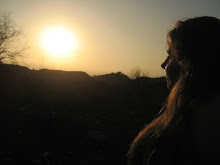
A friend of mine from the states responded to my request for questions with a string of interesting ones for me to answer. Here are her questions and my responses.
“How do people react to the fact that the Stocks are Christians? Do they even know, mostly? You said that Paul prayed at the end of the visit with Golden, but that was in a place where you said people worship other gods every day... did those listening receive it, act like they didn't like it, seem curious, have no idea what was going on, or what? Are non-Christians in Pakistan generally anti-Christian, or more open like in the U.S.?”
Hindus tend to be pretty tolerant (Golden and most of the people the Stocks work with are Hindu.) Hindus have a "cover all your bases" policy and are often happy to have Christian's pray for them and worship in their villages. Some are very friendly and worship our God themselves on a regular basis. What they don't like is the Christian concept of "one true God". Missionaries have to develop relationships with them, and hopefully demonstrate some of the power of Christianity, before they are open to offending their own gods by exclusively worshiping the Christian God.
I haven't had much interaction with Muslims here. Most of the people in the towns and cities, the ones who aren't wearing tribal clothes, are Muslim. They stare at us sometimes, because we are western, but don't seem particularly hostile to our Christianity. There are many churches here, three close to our house, though there are many more mosques. Christianity isn't underground here and seems to be considered a legitimate option by the Muslim majority. But, as I've said, the Stocks work almost entirely with Hindus, so I don't know first hand what it is like to share the gospel with Muslims.
Pat adds that Muslims are very interested in religious conversations. Muslims here are offended by Godless, hedonistic America but respect God-fearing Christians and respect the development work missionaries are trying to do. As opposed to feeling hostile, they pity Christians for not having the full revelation and for following such a minor prophet as Jesus Christ. Pat says that her approach with Muslims is to encourage them to read the Bible for themselves. She reminds them that the Quran actually proscribes reading the Bible and that the Bible supplies many details about our prophet that are not included in the Quran. The scriptures speak for themselves, she told me, if they would just read it.
It seems to me, in a way, that Pakistanis are MORE open to Christianity than in the US. Pakistan is a deeply religious nation. All people believe that god(s) exist, are powerful and important. People are eager to know your understanding of the truth and to put it to test in real life. There isn't a scorn for Christians as ignorant and backward here. Christians often bring education, compassion, and medicine. The big barrier is the fact that, since religion is so very ingrained in the cultural practices of these people, to change your religion affects every part of your life. That is one reason why many people practice Christianity but do not make a public confession of faith.
“Also, do women wear burqas there? Do you ever?”
Many women wear burqas but so far I have not. When walking around the bazaar, I’ve seen a great variety of women’s clothing from fashionable shalwar chamises with head scarf on or off, to various tribal outfits, to burkas. It seems to be up to you what you want to wear. Many older women wear the burqas, perhaps because they're tired of dealing with the extra vigilance you need when you wear more attention-getting clothes. Burqas give you a comfortable anonymity which lets your go about your business in peace. Younger or less traditional women can choose to work the more fashionable alternatives the way American women can choose to wear flashy advertisement-style clothes if they think they can pull it off. It’s up to you.
Only children or men, however, wear western style pants and shirts. It would be considered pretty immodest for a woman, sort of like a girl showing mid-drift, cleavage, and wearing heavy makeup would look in the US. Still, my friend Lily told me that she and her city friends in Hyderabad sometimes wear pants and shirt and that it is not scandalous. In the picture she showed me, the clothes were so shapeless that she and her friends really looked like boys.
For me, I wear a tribal outfit if going to a tribal worship service or funeral. The rest of the time, I wear loose shalwar chamises, the cultural equivalent of loose jeans and a loose t-shirt, moderate and accepted. I keep my head scarf strictly over my head when in public or when praying, a gesture of being conservative and not interested in attention. When with friends or at Christian events, my scarf stays draped across my shoulders like a backwards shawl. Around the house, with the children and the household help, neither Pat nor I feel the need to wear the scarf at all. I do not feel any angst to wear western clothes while here. The shalwar chamises come in every color and design, are comfortable for the temperature, and do not reveal the flaws in my figure.
Thanks for the questions, Annie!

Michelle, I met Mrs. Veeda Javaid here at the Presbyterian General Assembly in Minneapolis. She's from Pakistan and knows the Stocks. She works for a Presbyterian mission somewhere near them. When I asked if she knows Paul and Pat, she exclaimed, "Sure, everybody knows them!" She would like for you to pass on her greetings to them. I gave her a gift on your behalf, and she was very grateful (she said she could not afford to buy anything from me, but that she really liked what I had).
ReplyDelete